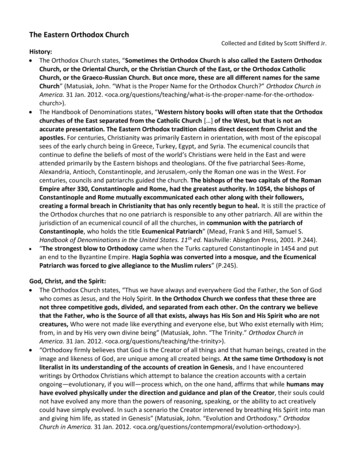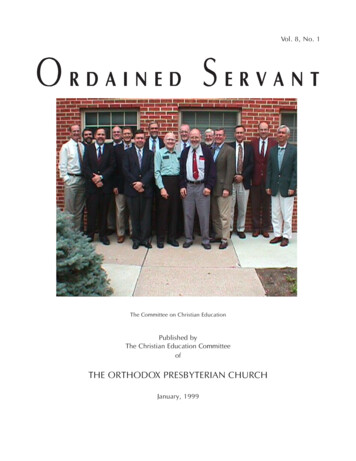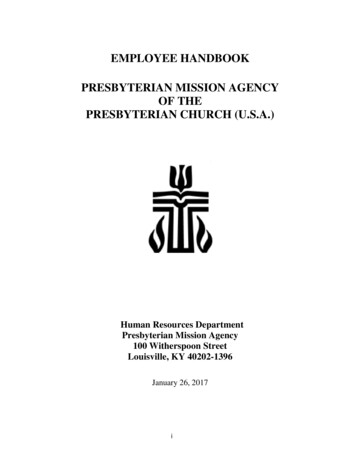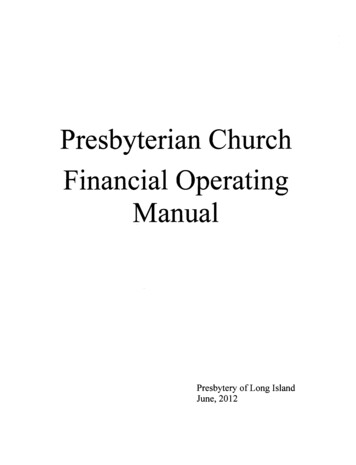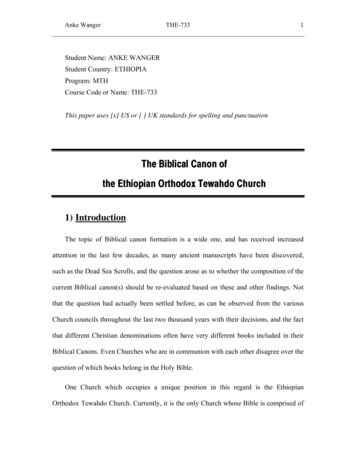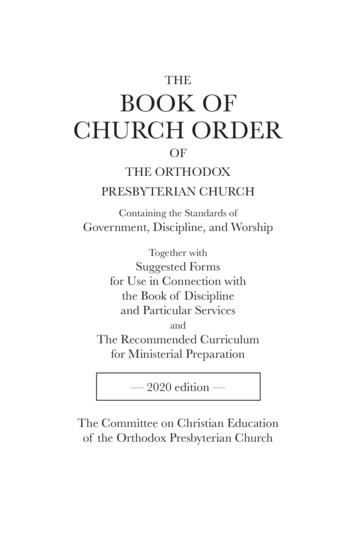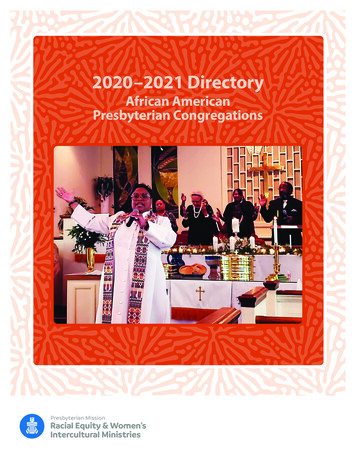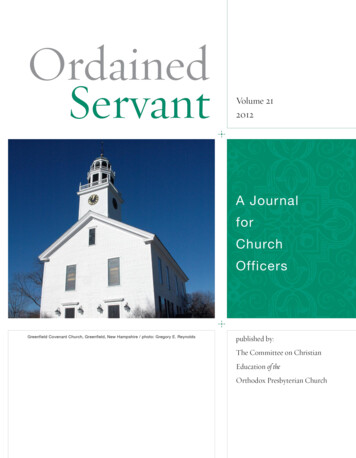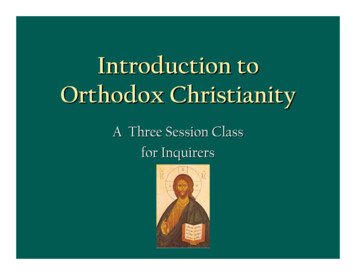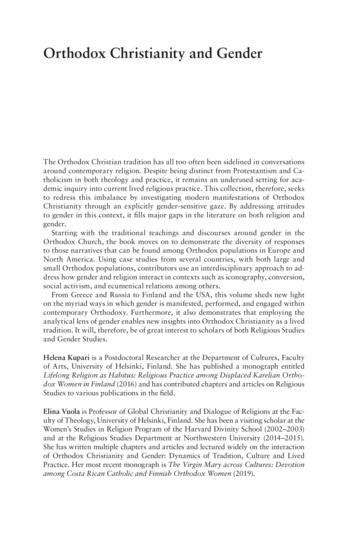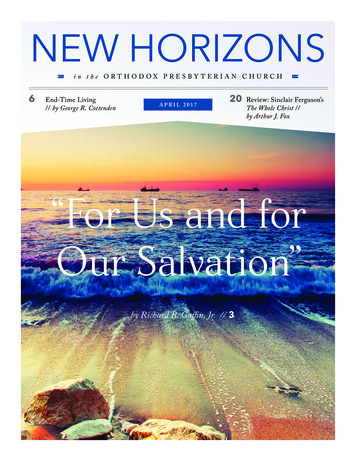
Transcription
NEW HORIZONSin the ORTHODOX PRESBYTERIAN CHURCH6End-Time Living// by George R. CottendenAPRIL 201720Review: Sinclair Ferguson’sThe Whole Christ //by Arthur J. Fox“For Us and forOur Salvation”by Richard B. Gaffin, Jr. // 3
VOLUME 38, NUMBER 4CON T E N T SF E AT U R E S3“For Us and for Our Salvation”By Richard B. Gaffin, Jr.6End-Time LivingBy George R. Cottenden8The Reformation of Church PolityBy John MuetherDEPART MENTS10Foreign MissionsPresbyterian church forming in East Asia12Christian EducationReview: Choosing the Good Portion Our membership vows Out of the mouth 14Home MissionsCorona, Calif.16StewardshipGiving and worship17Prayer Calendar19News, Views, & ReviewsOn January 28, fourteen people from San AntonioReformed Church (Andrew Moody, pastor) took ashort mission trip to Austin to join with people fromSouth Austin Presbyterian Church (Jim Cassidy,pastor) in reaching out to the neighborhood inwhich they meet for worship.2 / NEW HORIZONS / APRIL 2017New Horizonsin the Orthodox Presbyterian ChurchEditor:Danny E. OlingerManaging Editor:James W. ScottEditorial Assistant:Patricia E. ClawsonCover Designer:Christopher TobiasProofreader:Sarah J. PedersonEditorial Board:The Committee on ChristianEducation’s Subcommittee on Serial Publications 2017 by The Committee on Christian Education ofThe Orthodox Presbyterian Church. All rights reserved.Unless otherwise indicated, all Scripture quotations arefrom The ESV Bible (The Holy Bible, English StandardVersion ), copyright 2001 by Crossway, a publishingministry of Good News Publishers. Used by permission.All rights reserved. (We use the 2011 revision.)Articles previously published may be slightly edited.New Horizons (ISSN: 0199-3518) is publishedmonthly except for a combined issue, usually AugustSeptember, by the Committee on Christian Educationof the Orthodox Presbyterian Church, 607 N. EastonRoad, Bldg. E, Willow Grove, PA 19090-2539; tel. 215830-0900; fax 215-830-0350.Letters to the editor are welcome. They should dealwith an issue the magazine has recently addressed.Their language should be temperate, and they may notcharge anyone with an offense. They should be brief,and they may be condensed by the editor.Send inquiries, letters to the editor, and othercorrespondence to the editor at olinger.1@opc.org.Send address changes to CCEsec@opc.org. Allow sixweeks for address changes.The digital edition (PDF, ePub, mobi) and an archive ofprevious issues are available at www.opc.org.Views expressed by our writers are not necessarilythose of the editors or official positions of theOrthodox Presbyterian Church.Copies are distributed free to members and friendsof the Orthodox Presbyterian Church. Nonmembersare asked to donate 20.00 for an annual subscription(USD 30.00 if sent to addresses in Canada; 40.00elsewhere abroad). A free e-mail PDF subscription isalso available. Requests for a subscription should besent to CCEsec@opc.org or the address below.Periodicals postage is paid at Willow Grove, Pa., and atadditional mailing offices. Postmaster: Send addresschanges to New Horizons in the Orthodox PresbyterianChurch, 607 N. Easton Road, Bldg. E, Willow Grove, PA19090-2539.
“FOR US ANDFOR OUR SALVATION”RICHARD B. GAFFIN, JR. // In making use of the Nicene Creedin our worship, we confess in part about the Lord Jesus Christ thathe “for us and for our salvation came down from heaven, and wasincarnate by the Holy Spirit of the virgin Mary, and was made man;and was crucified also for us under Pontius Pilate; he sufferedand was buried; and the third day herose again according to the Scriptures,and ascended into heaven, and is seatedat the right hand of the Father; and heshall come again, with glory, to judgeboth the living and the dead; whosekingdom shall have no end.” Togetherwith the rest of the “one holy catholicand apostolic” church down through thecenturies, we affirm what has achievedand continues to secure our salvation:the death, resurrection, ascension, andheavenly session of the incarnate Son,the eternal Son of God become man.This confession prompts the question I want to consider here. How specifically is the resurrection “for our salvation”? What in particular is the savingefficacy, or “efficiency,” of the resurrection? Or, to ask the question negatively,without the resurrection, what wouldbecome of our salvation?To the question of how Christ’sdeath is for our salvation, virtually every Christian will likely have a readyand heartfelt answer: he died that mysins might be forgiven, to bear in myplace the eternal punishment my sindeserves. Most if not all believers graspin some measure the saving truth of penal substitution, of Christ’s “once offering up of himself a sacrifice to satisfydivine justice, and reconcile us to God”(Shorter Catechism, 25). At the sametime, however, it seems fair to say thatin general Christians are not as clearabout the answer to our question aboutthe saving efficacy of the resurrection.the resurrection. His resurrection, noless than his death, is at the heart of thegospel (Rom. 1:3–4; 1 Cor. 15:3–4). Theresurrection is often viewed primarilyas the awesome miracle that validatesthe truth of Christianity and the gospel. But it is more than such crowningevidence—much more.No Resurrection, No SalvationSalvation on its negative side issalvation from sin. All too evidently thedestructive consequences of sin are virtually incalculable, its misery untold. Atthe same time, those innumerable consequences are basically twofold. First,sin affects our standing before God; itrenders us guilty, liable to his just judgment and condemnation. Second, it affects our condition, in that it leavesus thoroughly corrupt and enslaved toSatan and sin as the power that dominates our lives. The depth of sin’s effectsare such that, left to ourselves, apartfrom God’s saving grace, we are nothing less than “dead in . trespasses andsins” (Eph. 2:1, 5). Sin leaves the sinnerIt should be immediately apparentthat the death of a dead Christ, a Christwho remains dead, achieves nothing forour salvation. Paul makes that clear in1 Corinthians 15: if Christ hasn’t beenraised, then our faith is “futile,” or “useless,” and we are “still in [our] sins”—entirely—and our situation all told is“most to be pitied” (vv. 17, 19). Minusthe resurrection, death continues withunabated, invincible finality, and it doesso as “the wages of sin” we so justly deserve (Rom. 6:23).Certainly without the death ofChrist there is no salvation, but thenneither is there any salvation withoutSin, Salvation, and theResurrectionNEW HORIZONS / APRIL 2017 /3
both inexcusably guilty and helplesslyenslaved.“But where sin abounded, graceabounded much more” (Rom. 5:20,nkjv). As the effects of sin, in itsabounding, are either one of two basickinds, so too, in countering and alleviating these effects, grace—manifold,superabounding in its effects—is basically twofold. Grace is either judicial orrenovative, reversing either our guiltridden standing before God or our corrupt, sin-enslaved condition. The role ofthe resurrection in bringing about thatreversal can be seen here by focusing onjustification and sanctification.The Resurrection and JustificationFor justification, a key text is Romans 4:25: Jesus “was delivered up forour trespasses and raised for our justification.” Earlier in Romans, Paul hassaid that Christ’s death was a propitiatory sacrifice, so that God might be “justand the justifier” of believers (3:25–26).Later he says that “we have now beenjustified by his blood” (5:9). In 4:25,however, justification is connected specifically with Christ’s resurrection indistinction from his sacrificial death.How are we to understand thatconnection? On the basis of his life ofobedience, culminating in his death asthe representative sin-bearer and righteous substitute for sinners (Phil. 2:8;Rom. 3:25; 8:3; 2 Cor. 5:21), Christ’sresurrection is his own justification.This is so in the sense that the actionof God in raising him from the dead—that enlivening act itself—vindicateshim in his obedience and effectivelydemonstrates his righteousness. Theresurrection, then, is a de facto declaration of his righteous standing beforeGod. As an event, Christ’s resurrection“speaks,” and it does so judicially, in alegal manner.First Timothy 3:16 confirms this.There Christ is described as “manifested in the flesh, justified in the Spirit”(nkjv). This almost certainly has inview the Holy Spirit’s action in raising Jesus from the dead (Rom. 8:11).This response by the Spirit was justly4 / NEW HORIZONS / APRIL 2017warranted by the righteousness manifested in Jesus’ obedience “in the flesh,”that is, during his life on earth prior tothe resurrection.But the justification of Christ inhis resurrection was not just for his ownsake, apart from us; it was also for us,“for our justification.” Our justification flows from our union with him, bySpirit-worked faith, along with theother benefits of salvation manifestedby that union (Larger Catechism, 69).Because of our union with him, then,we share in his justification; his resurrection-approved righteousness is reckoned as ours, imputed to us.At the same time, this union preserves a key difference—a gospel difference—that is not to be missed.Christ’s justification, unlike ours, doesnot involve the imputation to him ofthe righteousness of another. Unlike us,he is declared righteous on the groundof his own lifelong, blood-bought righteousness.Calvin has beautifully captured thisreality:Therefore, that joining together ofHead and members, that indwellingof Christ in our hearts—in short, thatmystical union—are accorded by usthe highest degree of importance, sothat Christ, having been made ours,makes us sharers with him in the giftswith which he has been endowed. Wedo not, therefore, contemplate himoutside ourselves from afar in orderthat his righteousness may be imputed to us but because we put on Christand are engrafted into his body—inshort, because he deigns to make usone with him. For this reason, weglory that we have fellowship of righteousness with him. (Institutes of theChristian Religion, 3.11.10)The Resurrection andSanctificationHow then is the resurrection essential for our sanctification —for therenovative side of salvation, for livespleasing to God and marked by holiness? That question can be answeredalong a number of lines, including theone we will follow here.Again, as with justification, unionwith Christ is crucial. We are unitedwith him in his death and resurrection,signified and sealed to us in baptism,“in order that, just as Christ was raisedfrom the dead by the glory of the Father, we too might walk in newness oflife” (Rom. 6:4). Here the resurrectionof Christ is linked specifically with thenewness that marks the Christian life.That newness surely has in view Christ’slife as resurrected, the resurrection lifehe shares with those who are united tohim.The source and quality of this lifeare further clarified in Romans 8:11: “Ifthe Spirit of him who raised Jesus fromthe dead dwells in you, he who raisedChrist Jesus from the dead will also givelife to your mortal bodies through hisSpirit who dwells in you.” What Godthe Father did in raising Jesus from thedead he will also do for believers. Thecontrolling thought here is the tie orunity that there is between the bodily resurrection of Christ and that ofChristians.The intrinsic nature of that unityis made most explicit in 1 Corinthians15:20, 23. There Christ is described as“the firstfruits” of the resurrection. Toextend the metaphor as Paul surely intends, his resurrection and ours are thebeginning and the end of one, singleharvest.Christ’s resurrection is, as is often said, the guarantee of ours, but weshould appreciate that this is so becausehis resurrection is nothing less than “theactual beginning of this general epochalevent” (Vos, Pauline Eschatology, p. 45).As believers, we can be sure of ourown resurrection, not only because Godhas decreed it and promised it (whichwould surely be enough for us!), butbecause he has done more: that decreehas been realized, that promise has already been fulfilled, in history; the resurrection harvest in which believers willshare bodily at the end of history, whenChrist returns, has already begun. It hasentered history and become visible in
his resurrection.The Resurrection, the Holy Spirit,and the ChristianRomans 8:11, as it highlights thisresurrection unity, brings into view theactivity of the Holy Spirit. God will resurrect us bodily, as he did Jesus, throughthe enlivening action of the Spirit. Butmore is said here than what will be truein the future. The Spirit of resurrectionis the indwelling Spirit; he is alreadypresent in believers. This points us to afundamental truth about the Christianlife: life in the Spirit is sharing in theresurrection life of Christ.That comes out clearly in theverses that immediately precede (vv.9–10). Four combinations are presentthere: (1) “you in the Spirit,” (2) “theSpirit in you,” (3) to “belong to him[Christ]”—equivalent here to “you in Christ,” and (4) “Christ in you.”These expressions hardly intend to splitthe believer’s life into four different sectors; together they provide a unified,overall perspective on that life.In this mutual indwelling, Christand the Spirit are one. In their presenceand activity, the Spirit is “the Spirit ofChrist” (v. 9). There is no relationship,no union with Christ, that is not at thesame time fellowship with the Spirit.There is no work of the Spirit in ourlives that is not also the presence ofChrist at work in us (see Eph. 3:16–17).This inseparable bond betweenChrist and the Spirit does not beginwith our experience; rather, it rests onwhat is first of all true in the experienceof Christ. In 1 Corinthians 15, we aretold that Christ, the last Adam, as the“firstfruits” of the resurrection harvest,became the “life-giving Spirit” (v. 45).At his resurrection, he was not only glorified by being transformed in his human nature by the enlivening power ofthe Spirit. He also came into a possession of the Spirit that was so climactic,so unprecedented, so overflowing, thatit is properly captured by calling himthe “life-giving Spirit.”Note that this in no way compromises the personal distinction betweenChrist and the Spirit. The eternal, essential distinction and equality betweenthe second and third persons of theTrinity remain unchanged.But because of who Christ, in hishuman nature, has become in his stateof exaltation, he and the Spirit are nowone in their work of giving life. This lifeis nothing less than resurrection life inthe Spirit. As we have seen, this is notonly a future hope, but already a presentreality for believers.Of course, the bond betweenChrist and the Spirit did not begin atthe resurrection. Christ was conceivedby the Spirit (Luke 1:35), and the Spiritlater descended on him at his baptismby John (Luke 3:21–22).The difference, the momentous difference, is this: At his baptism, Christreceived the Spirit as an endowmentto carry out the messianic task beforehim, the task that ultimately led to thecross. But in his exaltation, in his resurrection leading to his ascension (Acts2:32–33), he received the Spirit as theconsummate reward for having completed that assigned kingdom task. Andhe does not keep this reward for “hisown private use” (Calvin); it becomesthe consummate gift that he shares permanently with his people at Pentecost.So, Jesus Christ—the resurrected,life-giving Spirit—has promised us:“I am with you always, to the end ofthe age” (Matt. 28:20). He is with thechurch to stay, indwelling believers ashe provides every spiritual blessing andresource that we need to carry out ourkingdom task of discipling the nations.So, too, as the life-giving Spirit, he ispresent with us in a special, sacramental way when he invites us to communewith him at his table.Even More Than ThatHow, then, was Christ resurrected“for us and for our salvation”? I havedone little more here than to begin considering the answer. I have not yet takennote of what is as important as anything: Christ, “who died —more thanthat, who was raised,” intercedes for usat God’s right hand (Rom. 8:33–34).And that intercession of Christ, resurrected and ascended, as gracious as it ishardly gratuitous, refutes any and everycharge that would call into question thejustification of God’s elect. Moreover, itinsures, with an infallible efficacy, that“they can never fall from the state of justification” (Confession of Faith, 11.5).Finally, consider Romans 8:29.God’s predestinating purpose for believers centers ultimately in their being“conformed to the image of his Son,in order that he might be the firstbornamong many brothers.” This “image” isthe Son’s as he is resurrected, specificallyin his now-glorified human nature. Heis “the firstborn among many brothers” only as he is “the firstborn from thedead” (Col. 1:18).Our privilege, great beyond ourcomprehension, is this: we have beenchosen in Christ “before the foundationof the world” (Eph. 1:4) to the ultimateend that we be like Christ. This conformity to his image, already being workedin us by the sanctifying power of theSpirit (2 Cor. 3:18; Gal. 4:19), will befully realized when, like him, we areraised bodily.But there is more to this than whatis ultimate for us. Even more ultimatein God’s predestinating purposes iswhat is at stake for the Son personallyin our salvation, what he has investedfor himself. This, as much as anything, iswhy from all eternity the Son willed, together with the Father and the Spirit, tobecome incarnate, to suffer and die. Hedid so, so that, having been resurrectedtriumphant over sin and death, he mighthave brothers like himself—brothersglorified not because of anything inthemselves, but entirely because of hissaving mercy. They will share with himin this triumph and magnify forever hisown preeminent exaltation glory. Andso his “kingdom shall have no end.”Surely there can be no more ultimate perspective on Christ’s resurrection“for us and for our salvation” than this.The author, an OP minister, is emeritusprofessor of systematic theology at Westminster Theological Seminary.NEW HORIZONS / APRIL 2017 /5
END-TIME LIVINGGEORGE R. COTTENDEN // What time it is often determinesthe way you act. For example, you behave differently on Saturdaymorning, when you don’t have to get to work or school, than you doon the other days of the week. You may even sleep in.In a football game, strategy changes at different times in thegame, especially once the two-minutewarning has sounded and the team withthe ball is eager to score.What we eat and drink also depends on what time it is. If I want agood night’s sleep, I avoid caffeinatedcoffee in the evening.In each of these cases, the way welive is shaped by what time it is.In 1 Peter 4:1–11, the apostlewants his readers to understand that welive in a certain kind of time that mustgovern our actions. He says, “The end ofall things is at hand” (v. 7).Similarly, the Epistle to the Hebrews begins, “Long ago, at many timesand in many ways, God spoke to ourfathers by the prophets, but in these lastdays he has spoken to us by his Son.”The apostle John says, “Children, itis the last hour, and as you have heardthat antichrist is coming, so now manyantichrists have come. Therefore weknow that it is the last hour” (1 John2:18).In 1 Peter 1:20, we read that Christ“was made manifest in the last times.”The last days, the last hour, the last6 / NEW HORIZONS / APRIL 2017times—this is the period in which welive. These expressions refer to the yearsfrom the first coming of Christ until hereturns in glory. This period is seen asone block of time that shapes who weare and the way we are to respond to thevaried affairs of life.Living with an Awareness of WhoWe Are in ChristHow are we supposed to live in theend-time? What is special about theperiod of time in which we live?In the first place, we are to live withan awareness of who we are in Christ.We are to think in the same way hedid when he was on earth. Peter says inverse 1, “Since therefore Christ sufferedin the flesh, arm yourselves with thesame way of thinking.”The reference to Christ suffering inthe flesh points back to what Peter saidin 3:18: “For Christ also suffered oncefor sins, the righteous for the unrighteous, that he might bring us to God,being put to death in the flesh but madealive in the Spirit.” What is in view inthis verse isn’t simply Christ’s sufferingin a general sense during the period ofhis humiliation. Rather, it refers specifically to Christ’s suffering unto death onthe cross.Jesus endured a substitutionarydeath. He suffered, “the righteous forthe unrighteous.” He died in the placeof his people. He bore our guilt onCalvary. He took our place, so that theNew Testament can say of us that wehave died with Christ. Our union withChrist in his death defines who we arenow. We are people who have died. Weno longer have the same relationship tosin and death that we had before.Peter picks up on this in chapter 4.The Christian who has suffered in theflesh, in the sense that Christ has suffered in the flesh, has “ceased from sin”(v. 1). The point is not that Christ wassinning and then stopped sinning because of his death. Rather, he bore ourguilt and, having taken it to the cross,he no longer bears that burden. He hastaken care of it once and for all.United to Christ through faith, wetoo have died to sin. We have ceasedfrom sin, not in the sense that we no
longer sin or are tempted to sin, butin the sense that we have been set freefrom the curse and bondage of sin.We are no longer slaves to sin. Whentemptations come, we have the ability,by God’s grace, to resist them and turnaway from sin to live in accordance withthe will of God.Believers been have united toChrist, not only in his death, but alsoin his resurrection. This too has consequences for the way we live.Near the beginning of his letter,Peter blesses God the Father because wehave been “born again to a living hopethrough the resurrection of Jesus Christfrom the dead” (1:3). In that hope, wehave been set free from the control ofsin, “so as to live for the rest of the timein the flesh no longer for human passions but for the will of God” (4:2).“Human passions” could be takenin the general sense of “human desires.”It is true that union with Christ sets usfree from being dominated by our desires. In the light of the next few verses,however, it seems that Peter is focusing especially on the sinful desires thatdominate unbelievers. If we know whowe are in Christ, we can live as thosewho are free from such desires to do thewill of God as revealed in his Word.Living with an Expectation of theReturn of ChristIn verse 7, Peter points to a secondtruth that should shape our lives as welive in this present age. We are to live inexpectation of the return of Christ.He says, “The end of all things is athand; therefore be self-controlled andsober-minded.” He goes on to speak ofconduct that should be seen in us because the end of all things is at hand.History has a goal. There is an end tothe present order. We don’t know whenit will occur, but we do know that, eversince Christ’s first coming, it has been“at hand.”This knowledge must shape theway we act. An approaching deadlinecan change the way you think about aproject. Consider how knowing thata term paper at school or a project atwork is due tomorrow can concentrateyour attention. Well, we are staring ata deadline. Christ is coming again. Wedon’t have forever to show love or hospitality. We don’t have forever to prayfor and share the gospel with those whoare lost in sin.Peter says, “Be self-controlled andsober-minded for the sake of yourprayers” (v. 7). He tells us to be a focused, praying people, self-controlledand sober-minded as we address ourselves prayerfully to the needs of oursin-cursed world.“Above all,” he says, “keep lovingone another earnestly” (v. 8). This is notsimply an emotional “I like you and Ilike to be around you” kind of love. Peteris describing love that is stretched taut.That is what biblical love looks like inpractice. It is not something that justflows as emotions gush. It involves adisciplined application of the resourceswe have for the benefit of those whomwe love.This love “covers a multitude ofsins” (v. 8). What sometimes gets in theway of our loving people is that theyare not very lovable. We forget that wearen’t very lovable either, but Christ stillloves us. If we really love someone forChrist’s sake, that love will cover a multitude of their sins. As we read in Proverbs 10:12, “Hatred stirs up strife, butlove covers all offenses.”This covering of sins, of course,does not mean ignoring them to thehurt of the sinner or of others. There aretimes when you have to approach someone about their sins so that they can getright with the Lord. But we are not tolet those sins be barriers to a proper lovefor the sake of Christ.This love involves showing hospitality to one another without grumbling. In the first century, hospitalitywas very important. Travelling missionaries needed believers to open theirhomes to them.That isn’t as often the case today.But hospitality can be shown in a variety of ways as we reach out to peopleto meet their needs, share our resourceswith them, and welcome them into ourhomes. If we see ourselves as stewardsof the gifts and resources that God hasentrusted to us (v. 10), there is no roomfor grumbling.Living with a Focus on the Gloryof ChristBut there is still a third characteristic that shapes faithful end-time living.We are to live in such a way that ourfocus is on the glory of Christ.Peter speaks first about God beingglorified through Christ. We are to live“in order that in everything God maybe glorified through Jesus Christ.” Wehave a variety of motives for why wedo things, some good and some not sogood. Is your dominant motive that youwant to glorify God through Christ?God sent his Son to redeem a peoplewho would be conformed to his image.As we live in the ways he has just described, the fruit of Christ’s work becomes evident and God receives glory.Peter ends the section with an ascription of praise. “To him belong gloryand dominion forever and ever. Amen”(v. 11). Does “to him” refer to Christ orto God? The sentence structure makesthe former slightly more likely. Also,there is a similar doxology in Revelation 1:5–6, where it clearly is Christwho is in view. But God is also glorifiedthrough Christ, because of the way thework of Christ shows itself in your lifeand mine.Peter goes further, saying thatChrist himself, the second person of theTrinity made flesh, receives glory. Thisis what Jesus prayed for in John 17:5,“And now, Father, glorify me in yourown presence with the glory that I hadwith you before the world existed.” Asthe second person of the Trinity, he always has had glory. Now, as the Godman, ascended to heaven and seated atthe right hand of the Father, he is glorified when we live as those who knowthat we are in the end-time. Live thenfor his glory, as those united to him byfaith and eagerly awaiting his return. Tohim be glory forever and ever. Amen.The author is a retired OP pastor.NEW HORIZONS / APRIL 2017 /7
THE REFORMATIONOF CHURCH POLITYJOHN MUETHER // Reformation historians commonly distinguish between first- and second-generation Reformers. Those inthe first generation (most notably Luther and Zwingli) were pioneers in their proclamation of the formal and material principlesof the Reformation, namely, the authority of Scripture andjustification by faith alone. Buildingon this foundation, the second generation consolidated theological insightsinto confessional statements and oftenfocused their attention on the orderand discipline that should characterizechurches of the Protestant faith. The innovations of Roman Catholics, on theone hand, and the anarchy of Anabaptists and other radical Reformers, on theother hand, provided ample evidence ofthe dangers of a disordered church.The Reformed wing of the Reformation sought especially to honorChrist as the only head of the churchand thus came to express what can becalled the regulative principle of churchgovernment: Christ’s Word clearly reveals the structure of the church, andso the government of the church mustfind its basis in apostolic teaching andpractice.Developments in StrasbourgThis fine-tuning of church politywas a particular focus of Martin Bucerduring his labors to reform the churchin Strasbourg. In drawing up church ordinances for the city, a particular insighthe drew from the New Testament wasthe importance of the role of the ruling8 / NEW HORIZONS / APRIL 2017elder in the administration of churchdiscipline.In addition, Bucer argued thatchurch councils must submit to Christthrough the rule he has established inhis Word. Delegates to councils mustbe chosen with prayer and fasting, andwith careful examination, in order thattheir spiritual gifts would be displayed.Once commissioned, councils had tohear these delegates, lest they silencethe voice of the Spirit. (Here is a pointworth pondering at Presbyterian assemblies, when commissioners are temptedto end lengthy debate by means of theparliamentary device known as “callingthe question.”)Meanwhile, as John Calvin wasindependently coming to many similarconclusions in Geneva, he was personally experiencing the effects of disorderly polity during his first tenure in thatcity. The question of who had authorityto excommunicate provoked a disputebetween Calvin and the political authorities. He and other ministers werebanished in 1538 by the city council,which held, in Calvin’s judgment, excessive control over the discipline ofthe church. When Calvin sojournedin Strasbourg from 1538 to 1541, therole of the older Bucer was formative,especially in the development of Calvin’s understanding of biblical churchpolity. From his vantage point in Strasbourg, Calvin also witnessed a negativeexample. In nearby Lutheran territories,the state was dominating the c
New Horizons (ISSN: 0199-3518) is published monthly except for a combined issue, usually August-September, by the Committee on Christian Education of the Orthodox Presbyterian Church, 607 N. Easton Road, Bldg. E, Willow Grove, PA 19090-2539; tel. 215-830-0900; fax 215-830-0350.
